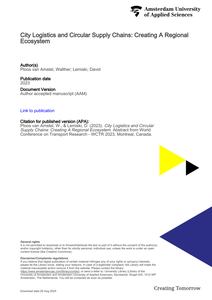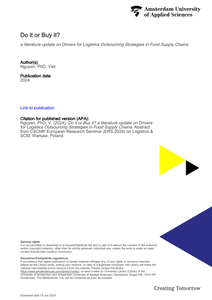Summary Project objectives This study fits into a larger research project on logistics collaboration and outsourcing decisions. The final objective of this larger project is to analyze the logistics collaboration decision in more detail to identify thresholds in these decisions. To reach the overall objectives, the first step is to get a clearer picture on the chemical and logistics service providers industry, sectors of our study, and on logistics collaboration in these sectors. The results of this first phase are presented in this report. Project Approach The study consists of two parts: literature review and five case studies within the chemical industry. The literature covers three topics: logistics collaboration, logistics outsourcing and purchasing of logistics services. The five case studies are used to refine the theoretical findings of the literature review. Conclusions Main observations during the case studies can be summarized as follows: Most analyzed collaborative relationships between shippers and logistics service providers in the chemical industry are still focused on operational execution of logistics activities with a short term horizon. Supply management design and control are often retained by the shippers. Despite the time and cost intensive character of a logistics service buying process, shippers tendering on a very regular basis. The decision to start a new tender project should more often be based on an integral approach that includes all tender related costs. A lower frequency of tendering could create more stability in supply chains. Beside, it will give both, shippers and LSPs, the possibility to improve the quality of the remaining projects. Price is still a dominating decision criterion in selecting a LSP. This is not an issue as long as the comparison of costs is based on an integral approach, and when shippers balance the cost criterion within their total set of criteria for sourcing logistics services. At the shippers' side there is an increased awareness of the need of more solid collaboration with logistics service providers. Nevertheless, in many cases this increased awareness does not actually result in the required actions to establish more intensive collaboration. Over the last years the logistics service providers industry was characterized by low profit margins, strong fragmentation and price competition. Nowadays, the market for LSPs is changing, because of an increasing demand for logistics services. To benefit from this situation a more pro-active role of the service providers is required in building stronger relationships with their customers. They should pay more attention on mid and long term possibilities in a collaborative relation, in stead of only be focused on running the daily operation.
DOCUMENT

Little progress has been made in recent years toward achieving a fully circular economy by 2050. Implementing circular urban supply chains is a major economic transformation that can only work if significant coordination problems between the actors involved are solved. On the one hand, this requires the implementation of efficient urban collection technologies, where process industries collaborate hand-in-hand with manufacturers, urban waste treatment, and city logistics specialists and are supported by digital solutions for visibility and planning. But on the other hand, it also requires implementing regional and urban ecosystems connected by innovative CO2-neutral circular city logistics systems smoothly and sustainably managing the regional flow of resources and data, often at large and with interfaces between industrial processes and private and private and public actors. What are relevant research questions from a city logistics perspective?
MULTIFILE
This paper presents challenges in city logistics for circular supply chains of e-e-waste. Efficient e-waste management is one of the strategies to save materials, critical minerals, and precious metals. E-waste collection and recycling have gained attention recently due to lower collection and recycling rates. However, implementing circular urban supply chains is a significant economic transformation that can only work if coordination decisions are solved between the actors involved. On the one hand, this requires the implementation of efficient urban collection technologies, where waste collection companies collaborate with manufacturers, urban waste treatment specialists, and city logistics service providers supported by digital solutions for visibility and planning. On the other hand, it also requires implementing urban and regional ecosystems connected by innovative CO2-neutral circular city logistics systems. These systems must smoothly and sustainably manage the urban and regional flow of resources and data, often at a large scale and with interfaces between industrial processes, private, and public actors. This paper presents future research questions from a city logistics perspective based on a European project aimed at developing a blueprint for systemic solutions for the circularity of plastics from applications of rigid PU foams used as insulation material in refrigerators.
MULTIFILE

Western-European consumers have become not only more demanding on product availability in retail outlets but also on other food attributes such as quality, integrity, and safety. When (re)designing food supply-chain networks, from a logistics point of view, one has to consider these demands next to traditional efficiency and responsiveness requirements. The concept ‘quality controlled logistics’ (QCL) hypothesizes that if product quality in each step of the supply chain can be predicted in advance, goods flows can be controlled in a pro-active manner and better chain designs can be established resulting in higher product availability, constant quality, and less product losses. The paper discusses opportunities of using real-time product quality information for improvement of the design and management of ‘AgriFood Supply Chain Networks’, and presents a preliminary diagnostic instrument for assessment of ‘critical quality’ and ‘logistics control’ points in the supply chain network. Results of a tomato-chain case illustrate the added value of the QCL concept for identifying improvement opportunities in the supply chain as to increase both product availability and quality. Future research aims for the further development of the diagnostic instrument and the quantification of costs and benefits of QCL scenarios.
DOCUMENT

This quick guide is written to inspire designers, policy makers, company owners, employees, educators and students to change the linear economy into a circular economy by collaborating in local value chains. This guide explains the basics of circular economy, value chains and it gives practical tips for you to work with and practical examples to learn from. It is developed within the context of the Biocup project, part of the BIOCAS Interreg project supported by the North Sea Programme of the European Regional Development Fund of the European Union.
DOCUMENT

from the article: "Abstract The way in which construction logistics is organised has considerable impact on production flow, transportation efficiency, greenhouse gas emissions and congestion, particularly in urban areas such as city centres. In cities such as London and Amsterdam municipalities have issued new legislation and stricter conditions for vehicles to be able to access cities and city centres in particular. Considerate clients, public as well private, have started developing tender policies to encourage contractors to reduce the environmental impact of construction projects. This paper reports on an ongoing research project applying and assessing developments in the field of construction logistics in the Netherlands. The cases include contractors and third party logistics providers applying consolidation centres and dedicated software solutions to increase transportation efficiency. The case show various results of JIT logistics management applied to urban construction projects leading to higher transportation efficiencies, and reduced environmental impact and increased production efficiency on site. The data collections included to-site en on-site observations, measurement and interviews. The research has shown considerable reductions of vehicles to deliver goods and to transport workers to site. In addition the research has shown increased production flow and less waste such as inventory, waiting and unnecessary motion on site."
DOCUMENT

AbstractHistorically, epidemics and plagues are repeatedly reported to have happened since the ancient civilizations (Egypt, Greece, Rome and imperial China). Most known examples of a devastating global pandemics in recent history are the ‘Black Death’ (14th century) and the global influenza (1918-1919), also known as ‘Spanish Flu’, that has killed nearly 50 million people in the world. Even thoughpandemics may vary in their dimensions, length (short vs. long), scope (local/regional, national, global) and severity of effects (minimal effects or maximal effects), they all represent distinct exogenous and endogenous shocks that have far reaching effects on population, health, economy and other societal domains.Currently, the Covid-19 pandemic has relentlessly spreaded around the world, leaving behind destructive marks on health, populations, economies and societies. The Covid-19 could spread quickly around the globe because of the current structure of the global economy, which is highly interconnected through sophisticated global transport networks. An important characteristic of a suchnetworked complex system is it vulnerability to unattended events of systemic risk such as the Covid-19 pandemic for example. These systemic risks cause substantial cascading effects, which lead to extreme outcomes that could permanently alter economic, environmental, and social systems.In this article, we first, present, discuss and analyze the potential impacts of the Covid-19 on global economy, trade and supply chains, by focusing on Europe and/or the Netherlands. Second, we examine the effects of the Covid-19 crisis on the shipping industry and on the hub ports and the policy measures that have been applied by different countries around the world.
DOCUMENT

Implementing circular urban supply chains is a major economic transformation that can only work if significant coordination problems between the actors involved are solved. This requires, on the one hand, the implementation of efficient urban collection technologies, where process industries collaborate hand-in-hand with manufacturers and urban waste treatment specialists and are supported by digital solutions. On the other hand, it also requires implementing regional ecosystems connected by innovative CO2-neutral circular city logistics systems smoothly and sustainably managing the regional flow of resources and data, often at large-scale and with interfaces between industrial processes and private and public actors. Develop blueprint for circular urban region This research project aims to develop a blueprint for circular urban regions, including the demonstration of a territorial cross-sectorial, large-scale and sustainable systemic solution for the circularity of high-performance plastics from diverse applications of rigid polyurethane (PU) foams used as insulation material in refrigerators and construction elements. The research project develops a blueprint for regional participative governance using an approach involving multiple actors from the public-, private-, academic-, and financial sectors and civil society (by working in living labs).The focus of the presentation (and paper) is on the control tower elements of the circular urban supply chain and the elements to make the collaboration work.In terms of urban logistics and collection services is to make these materials accessible for downstream sorting and recycling processes for the first time in a sustainable and economically viable way. The project will develop a new way of processing defined waste streams like appliances (refrigerators), to separate chemically recyclable PU from a mixed plastics waste stream.
DOCUMENT

Accepted abstract to present at the CSCMP European Research Seminar (ERS 2024) on Logistics & SCM, to be held on June 20-21, 2024, in Warsaw, Poland.
DOCUMENT

This chapter proposes sustainable supply chains in agrifoods, achieved through logistical strategies to minimize food waste and losses. Proposals will recover organic and inorganic waste and reincorporate it into the supply chain or add it to new chains through new products generated from food waste. A literature review is presented regarding the causes of food losses and waste within the supply chain and the strategic opportunities in the logistical process to reduce such losses. The creation of models that include the three dimensions of sustainability in food logistics is required in order to achieve a reduction in waste and food losses in transport, as well as to minimize costs and environmental impacts. If a correct sustainable logistics is carried out, it would favor the reincorporation of waste into new supply chains.
DOCUMENT